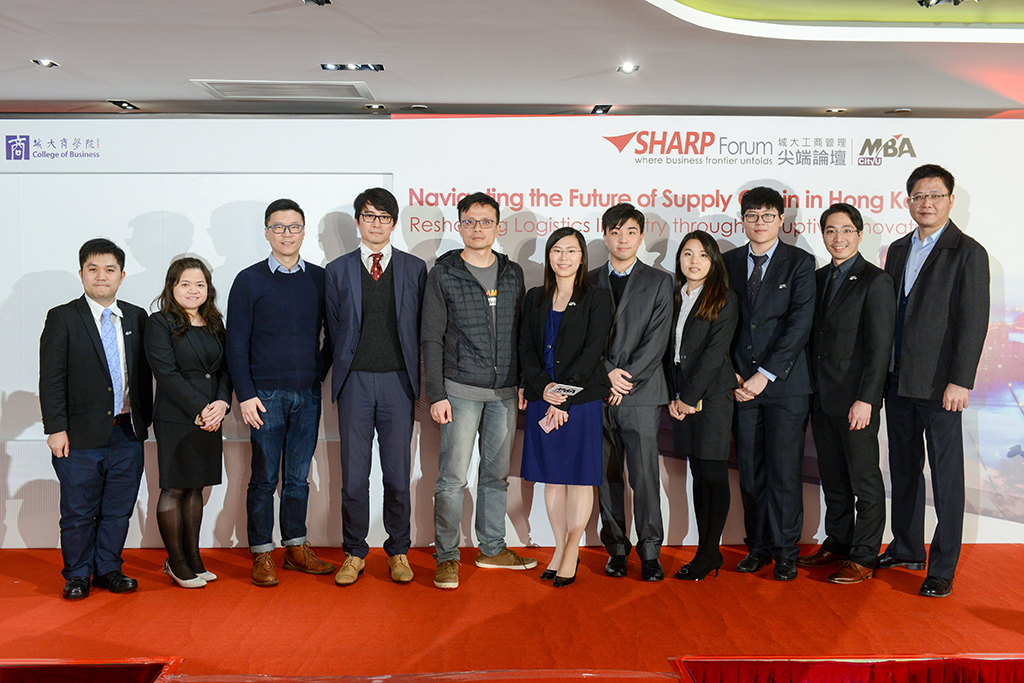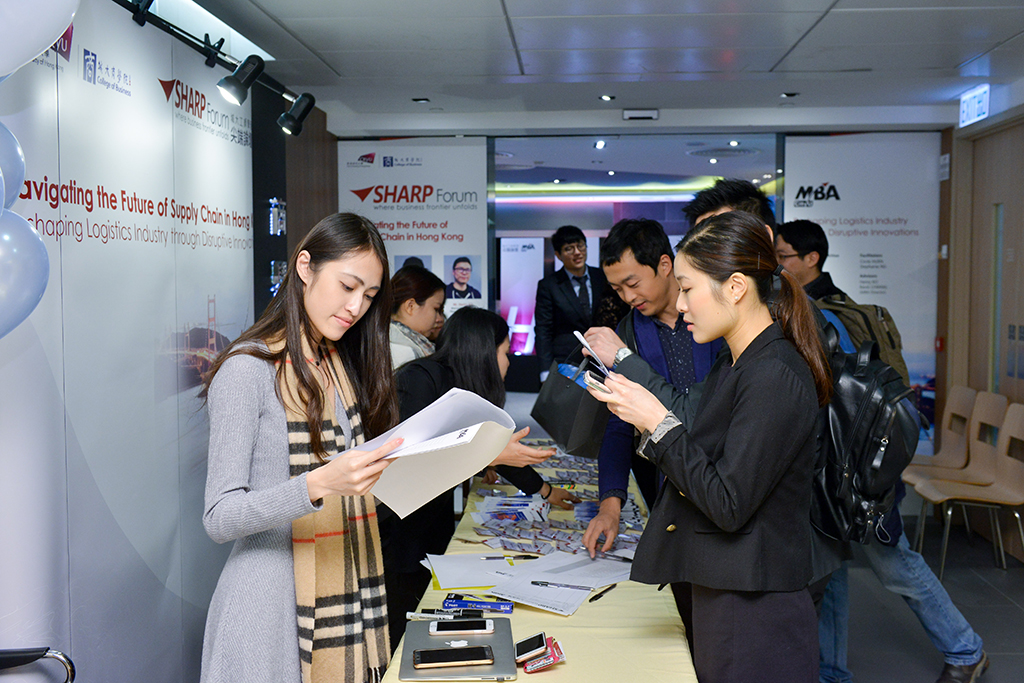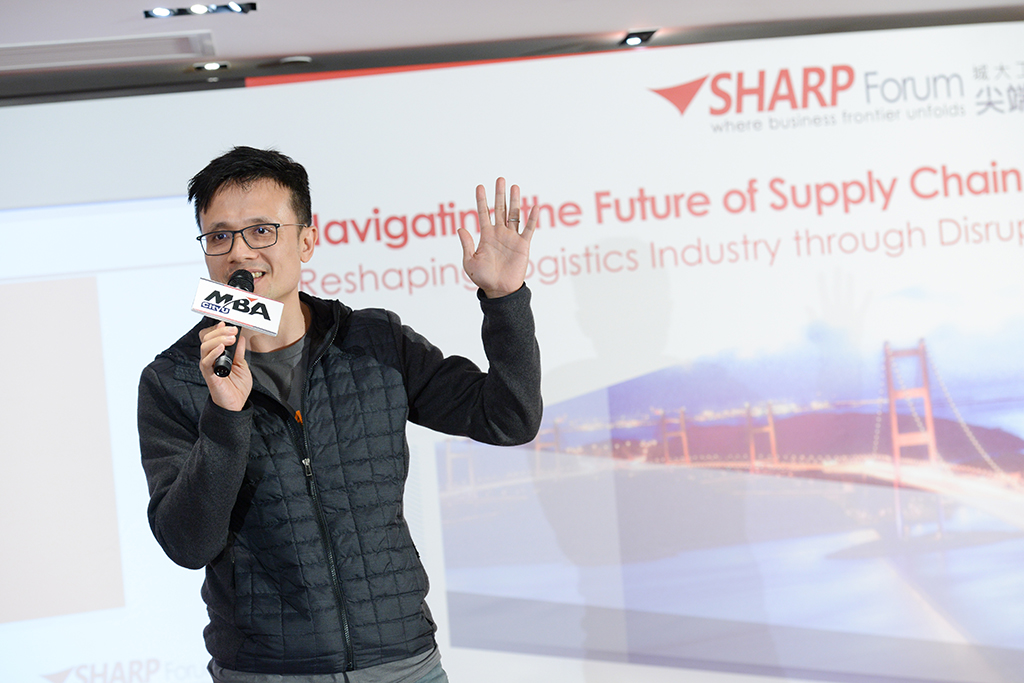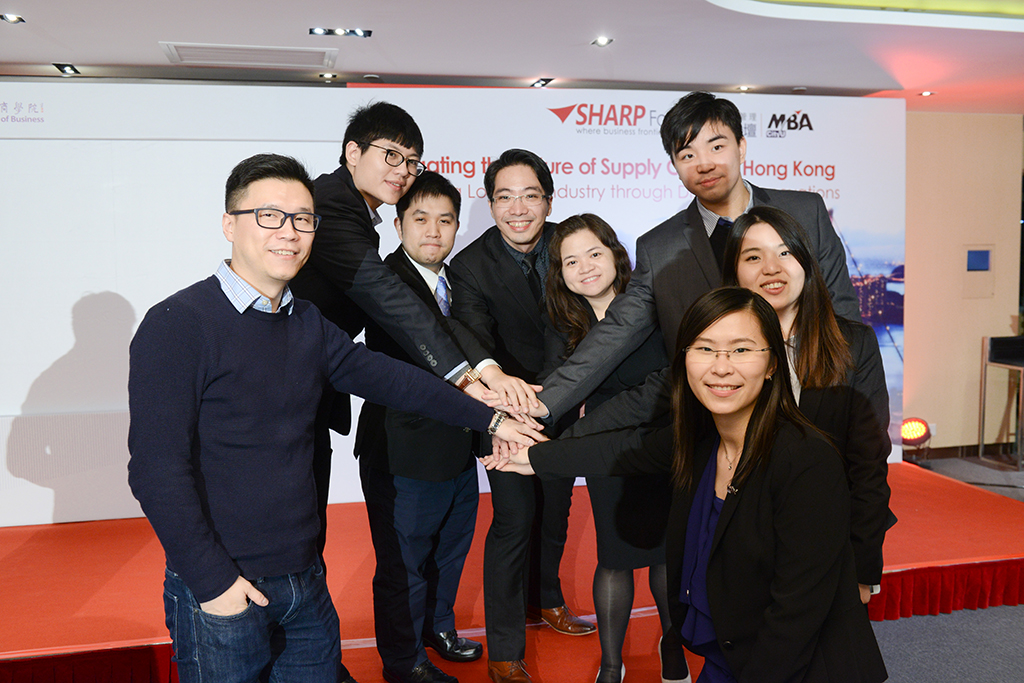 CityU SHARP Forum brought us to a thought-provoking talk on “Navigating the Future of Supply Chain in Hong Kong – Reshaping logistics Industry through Disruptive Innovations” by having a legendary start-up founder in logistic sector – Mr. Shing-Yuk Chow, CEO of Lalamove and a veteran official - Mr. Benjamin Wong, Head of Transport and Industrial, InvestHK of HKSARG as the guest speakers on Jan 16th, 2017 at CityU campus, which attracted over 100 audiences to participate in this event.
CityU SHARP Forum brought us to a thought-provoking talk on “Navigating the Future of Supply Chain in Hong Kong – Reshaping logistics Industry through Disruptive Innovations” by having a legendary start-up founder in logistic sector – Mr. Shing-Yuk Chow, CEO of Lalamove and a veteran official - Mr. Benjamin Wong, Head of Transport and Industrial, InvestHK of HKSARG as the guest speakers on Jan 16th, 2017 at CityU campus, which attracted over 100 audiences to participate in this event.
Kick-started by the MCs, Mr. Eric Hung (ChiuB), a popular radio DJ and Ms. Jessica Chow, member of the student committee for the SHARP Forum discussing with the audiences about their impressions on logistics, Mr Bosco Tsang, Chairman of student committee briefly gave the audiences an overview on the Hong Kong logistics industries.
We are aware that the trading and logistics industry is one of the four pillar industries of Hong Kong economy. It is the highest sector with 22.2% of Hong Kong GDP in terms of value-added in 2015 from the HKTDC Research statistics. As indicated in the latest report of a global market research firm, the global logistics market, in terms of revenue, was set to expand from US$8.1 trillion in 2015 to US$15.5 trillion by 2023. Hence, the student committee pointed out that this traditional industry has a huge potential to grow in Hong Kong.



When unprecedented technological breakthroughs continue to make evolutionary impact on customers’ last-mile delivery expectations and drive revolutionary transformation of new business models for collaborative efficiency, how will the innovations disrupt and reshape the logistics industry? In finding the answers to this question, the student committee invited 2 honorable guests speakers and conducted interviews with people working in various positions in the industry (i.e. couriers, pilot, professional traders and scholars) to learn how mobile internet and new tech apps influencing the industry from their perspectives. The interview videos were played during the forum and brought sparkling ideas to stimulate the speakers and audiences for a fruitful discussion.
Mr. Shing-Yuk Chow, CEO of Lalamove shared his experience as a pioneer in logistics industry and one of the few sustainable tech start-ups in Hong Kong. Shing thought that building tech start-ups in Hong Kong was not easy and the market is relatively small comparing nationwide markets nearby. However, he trusted that the logistics industry was still underpenetrated by mobile internet and saw where the opportunities lay ahead of them. He expanded the business model of “digitalized” call centre mechanism on van delivery services in Hong Kong to China and other Southeast Asian countries like Thailand and the Philippines with no such business model. By using his new tech platform, the on-demand delivery service mechanism in those countries was highly optimized. Traditionally, van drivers in China and SE Asian countries could only have 1 or 2 deals a day since they solely relied on old customers and referrals, whereas now they could do 3 to 4 deals a day after using the platform of Lalamove. The company has made great success and plans to explore new businesses. For example, a partnership in Bangkok with Line, the popular messaging app, to run a new delivery service combining takeaway meals, deliveries from local 7-11s and a courier – all done by Scooters.
Other than building a tech unicorn in Hong Kong, Shing put social responsibility as another important mission for his company to achieve. He told the audiences that the digitalized on-demand platform could boost the mechanism efficiency and also improve the living standard of the van drivers by increasing their orders. In a sense, it also reduced gasoline wastes by minimizing the chances of vans waiting for orders or travelling without goods on the roads. He encouraged young generation in Hong Kong to think and act something big. Other than traditional businesses like finance and property investment, Hong Kong could have some other promising industries like logistics that youths could invest their time and talents in. Shing concluded his sharing and said, ‘there will be the first one. Once you make something possible, a lot more people can achieve that.’ Graduated from Stanford University after scored 10 distinctions in Hong Kong Public Exam, Shing had worked in investment banks and became a professional gambler for 7 years before he put all his passions in starting logistic business.



After Shing’s sharing, Mr. Benjamin Wong, Head of Transport and Industrial of InvestHK, HKSARG shared with the audiences about the recent trends and future landscape in logistics from a macro view. Benjamin summarized the key advantages of Hong Kong in logistics, including world-class infrastructure to support intermodal logistics operation, simple tax regime and efficient customs clearance to attract private sector’s investment in Hong Kong logistics. He pointed out that other than traditional logistics such as foods, textiles, and IT electronics, there are 3 logistics trends rising significantly in recent year, that are high value-added products, e-commerce and technology integration.
In the high value-added products segment, Benjamin took arts and wines as the two noteworthy examples. Hong Kong is one of the world’s largest art markets by auction sales and it is also a free wine port with an access to 4.7 million high-net-worth individuals (HNWIs) in Asia Pacific, it attracts leading art logistics service providers from Taiwan to set up offices in Hong Kong and the China Merchants Logistics Group starting to free up more space in warehouse from rice storage for wine storage.
Under the boom of global B2C cross-border e-commerce market, Benjamin indicated that there are many opportunities in e-fulfillment and logistics operations such as regional consolidation and distribution for Hong Kong in considering the large and growing demand of China middle class in authentic good-quality foreign products.
In the trend of technology integration, Benjamin showed a few case studies on the new Hong Kong-based start-up tech companies in logistics to demonstrate more companies made use of technology to provide O2O innovative logistics services, e.g. Easyship and Freightos are start-ups providing online platform and cross-border market intelligence to facilitate e-retailers in choosing freight and other transportations options wisely, Klosit and PAKT provides offline personal storage solutions with online managing system for customers.
Looking at the government measures to support the future growth in logistics, Benjamin told the audiences that the government has determined to reserve land for logistics facilities development in Kwai Tsing and Tuen Mun West Area and has been developing transport infrastructure such as HK-Zhuhai-Macau Bridge, Tuen Mun-Chek Lap Kok Link and third Runway in airport to solve the problems of fast approaching current infrastructure’s maximum handling capacity. Apart from infrastructure measures, Benjamin added that InvestHK also launched the StartmeupHK Programme in 2013, an initiative to nurture startups in Hong Kong that covered logistics sector. The Forum moderator Mr. Henry Ko, Managing Director of Flexport Asia Limited summarized some of the thoughts collected from the interviews done by the Student committee and facilitated a great discussion with the two guest speakers to end the Forum. Before the Forum started, the audiences were entertained with live music performance specially arranged by the Student committee while awaiting.
